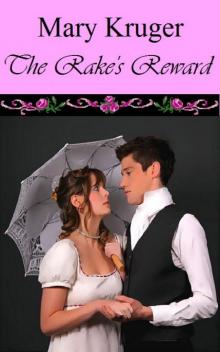- Home
- Kruger, Mary
In a Pirate's Arms Page 28
In a Pirate's Arms Read online
Page 28
“Another note for you, Mr. Brand,” Mrs. Sally said later that evening, when Marcus had opened his door to her knock. “Brought by that rude Englishman again.”
“Thank you, ma’am,” he said, taking the note and closing the door all in one smooth motion. Abbott’s choice of messenger was inspired: it added credibility to the story they were slowly creating about him, that he was sympathetic enough to the British cause to turn traitor. Too much so, he mused ruefully, breaking the wax seal on the note with his penknife. The last thing he had expected, he thought, setting the note down unread, was that Rebecca would believe him to be a spy.
He paced to his window and looked out into the soft spring twilight. Below him he could just see the river, with the lights of ships winking on it. It was a mess, this situation with Rebecca. Devil take it, he’d missed her. He hadn’t expected to, but he had. He missed her rare, sweet smile, her tart comments, her quick intelligence. He missed the way he felt when he was with her, alive and exhilarated. Most of all, he missed her in his bed.
The thought brought a sharp pang of yearning, and, grimacing, he turned away from the window. In some ways he was no better than her past lover, or Lieutenant Dee; he wanted her as badly. But if simple desire were all he felt, he could slake it easily enough. There were always willing women available. He wanted more. He wanted to be with her, live with her, have children with her. He wanted, God help him, to marry her.
Stunned, he sank down onto the edge of his bed. Marriage? Good God. Always he had been free to do as he wished, to roam the sea when he wanted, to go where he would. Never had he seriously contemplated marriage. Now, though, he wanted Rebecca with him, beside him, forever. That meant marriage. The irony was, she wanted nothing to do with him.
His eyes lighted on the note, discarded on his bed table, and, lips tightening, he reached for it. A few moments later he looked up, eyebrows raised. Then, deliberately, he thrust the note into the candle’s flame. When it was well alight he dropped it into the fireplace, leaning his arm on the mantel and watching it burn. Another task for him, and an important one. Abbott had apparently decided he would be more useful here than in Baltimore, after all.
Not that he would have gone. He was through taking orders from Abbott where Rebecca was concerned. She was his heart, his life, his soul. Shrugging into his coat again, preparatory for an evening visit to Abbott to garner more information, he made his decision. Somehow, some way, he would make Rebecca his.
Lights glowed from every window at the British legation on K Street. A different soldier was on sentry duty this evening, allowing Marcus in with little trouble. Inside, everything glittered. As if nothing untoward had occurred, as if events were not leading inexorably towards war, Sir Augustus, the minister, was holding a reception.
Inside the house, a fine staircase rose to his left; to this side as well were offices, Sir Augustus’s at the front. Halfway down the hall was the butler’s pantry where he had offered his services to St. John. To the right were the reception rooms, crowded tonight with those of Washington society who disapproved of the President and his policies; members of the Federalist party, as well as known British sympathizers. For one bad moment Marcus thought he saw Ezra Talbot, but then the man in question turned. Someone else. The Talbots, thank God, weren’t here tonight.
Hillary St. John looked at Marcus in surprise as he entered the drawing room, preparatory to paying his respects to Sir Augustus. “I didn’t expect to see you here tonight,” St. John said, crossing the room to him.
“Indeed? But I was invited, was I not?”
“Yes. We’d word you were returning to Baltimore.”
“Not quite yet.” He glanced towards the British minister, talking affably with a group of men. “I thought I’d try one last time for a license to trade.”
St. John pursed his lips. “Doubtful. The talk is that your president will ask for a declaration of war at any time.”
“I am not political,” Marcus said absently, his gaze sweeping about the drawing room and the room beyond, where refreshments awaited. Hoping for a glimpse of Rebecca; hoping she wasn’t here. “What the President does doesn’t concern me.”
“But won’t it affect your business?”
Marcus shrugged and flicked a piece of lint off the sleeve of his coat of black superfine. “I am prepared to move my shipping to Canada, if I must.”
“Are you.” St. John eyed him speculatively. “Well, I will speak to Sir Augustus for you once more, but don’t expect much. He’s other things on his mind these days.”
“Thank you.” He inclined his head to St. John as he turned away, well-satisfied with the evening so far. He had established his ostensible reason for being here, and strengthened his credibility with the British. It was a good start.
After greeting Sir Augustus, Marcus wandered into the other room in search of refreshment, pausing here and there to speak with people he knew. Leisurely he procured a glass of punch for himself; just as leisurely he made his way back across the room, until at last he stood in the relative coolness of the hall. It was peaceful here, with few people about, and none paying any mind to him. Marcus set his cup down on a table and glanced into the butler’s pantry. Empty. His muscles tensed. It was now, or never.
Quietly and quickly he slipped into the pantry and across it, to the stairs. Not as grand as the main staircase in front, but far more suited to his purpose, quiet and private. He paused for a moment at the bottom, waiting, listening, but no sound filtered down from upstairs. Taking care to stay close to the wall, lest a board creak, he began his ascent.
Once upstairs, he stopped a moment to let his eyes become accustomed to the darkness, and to get his bearings. Here were the minister’s private quarters, and more offices. Fortunately no one was about. It was the perfect opportunity for him to do a little snooping.
Third door from the stairs, to the left. Marcus counted, turned, and found the door. The door handle was stiff under his fingers, and he exerted pressure, turning it with a click that sounded like a pistol shot. He tensed, but no one appeared to have heard; no one came to investigate. Still, his shoulder muscles remained rigid as he stepped into the room and closed the door, the latch clicking loudly again. The thing needed a good oiling. There was, thank God, a key in the lock. It turned easily, giving him a sense of safety. If he should be discovered, he would have at least a chance of escape.
No telling where the papers he sought would be. Though moonlight streamed into the room, he struck flint to tinder and lit a candle. Its feeble light shone over a tidy desk, its surface bare, except for inkstand, pens, sander, and blotter. Against the wall were bookcases, and next to the desk was a green leather chair. Marcus sat in its companion behind the desk, trying the various drawers and finding them, to his relief, unlocked. Security needed to be tightened here. But then, who would expect someone to come snooping when the house was filled with people?
“You’ll know what you’re looking for when you see it,” Abbott had told him last night, his face creased with worry. Unusual for him, bringing the gravity of this situation home to Marcus. He had never questioned how Abbott knew about such things, about important papers or, in the past, secret agents traveling to England, who needed to be stopped. As the Raven, he had done so more than once. He suspected, though, that Abbott had installed someone in the legation. Someone who had seen papers of great importance in this very room, but who had not been able to see the details. Someone so thoroughly English that no one suspected his sympathies secretly lay with the Americans. Marcus saluted his courage, whoever he was.
A quick search of the top desk drawers yielded little. In the bottom ones he found more: a proposal for a possible blockade of the American coast, should war break out; an estimation of troop strength in Canada. Important, surely, but not vital, Marcus thought, scowling with frustration as he closed the desk drawer. Much of this information was already known. No, it had to be something different. Something new.
He found it before he quite reali
zed it, tucked in the back of the very bottom drawer, just when he was about ready to give up. At first he saw no significance in the sheets of foolscap, folded together, or the top page, with its crudely drawn map of a winding river, until suddenly he recognized it. The Potomac, as it narrowed near Washington City and Georgetown. And those x’s here and there—good God. The President’s House. The Capitol building. The Navy Yard. It looked like—his breath sucked in as he lifted the map and read the words on the paper beneath. “Plans for an Invasion of Washington City, District of Columbia.”
Good God. He read quickly now, relying on his well-trained memory to absorb the details. The Royal Navy to come up the Potomac in force. Fort Washington on the river to be sabotaged beforehand, by means unmentioned. Troops to be landed, and how many. Casualties expected, should the Americans fight back, as it was expected they would. And the objectives, the places marked with “x’s” on the map. Mr. and Mrs. Madison to be taken prisoner, along with Speaker of the House Henry Clay and members of the Cabinet. The President’s House to become British headquarters for the war, and afterwards. For the goal of the plan was more far-ranging than winning a war. Whoever had authored it intended that the United States would once again be Britain’s colony.
Good God, he thought again, and at that moment, heard voices. Coming from outside? No. From the corridor, faint, but clear. He snuffed the candle and sprang up from the desk, standing in readiness near the window. “I tell you, sir, I saw candlelight in the window,” a voice said. Dee’s voice.
“Most likely Reed, doing something Sir Augustus asked him to do.” St. John, sounding irritated. “I see no light beneath the door, lieutenant.”
“It was there. Damme, it’s locked.”
“No, that latch always sticks. Let me—it is locked.”
“I’ll look in the keyhole—damme, the key’s in the lock.”
Banging on the door. “Reed? Are you in there?”
Coolly, Marcus glanced out the window. Ivy twined on the side of the building. Good. He took off his coat, wrapping it about his waist, and pushed at the window. And, like the door latch, it stuck.
For the first time he felt just a bit of panic, and sweat trickled down between his shoulder blades. No longer caring if he made any noise, he struck at the window frame, and the sash at last budged, opening with a squawk. The pounding on the door increased. They were getting ready to kick it in, he thought dispassionately, climbing out onto the sill. A good thirty feet from here to the ground; nothing to one who had once perched at the top of a ship. Grasping a vine, hoping it would hold, he began to descend, using skills learned long ago at sea. Down and down, more surefooted now, the ground coming nearer, and from a distance he heard a crash as the door in the office above at last let go.
The ground at last. Marcus jumped nimbly down, landing in a crouch, and at that moment a shout came from above. “There he is!” Involuntarily he looked up, seeing a face in the window, and then, self-preservation taking over, began to run. A cracking noise, and there was a sudden, stinging sensation of heat along his arm. Damn! He’d been shot. Another crack, and he ducked, frantically pulling at his coat. His white shirt made him too clear a target. The black coat, chosen specifically in case he had to make an escape, wrapped around him just as he reached the trees, and he melted into the shadows. He was safe for the moment, but pursuit would come quickly. And here he was, trapped in the British legation grounds, high brick walls between him and freedom, and his arm injured. How the devil was he going to get out of this?
“He’s out here.” Dee’s voice was tense as he led to the contingent of soldiers into the mission’s garden. “Piper, O’Neill, see if he got over the wall there, and careful. The rest of you move out. You know what to look for—broken branches, the ground disturbed, and the like. Weapons at the ready! We don’t know if he’s armed.” He turned, surveying the garden. In the light of the moon shadows moved, shifted, from the trees and the bushes near the walls. It was impossible to tell where a man might be hiding. But, wherever the intruder was, Dee was determined to catch him. “Hart, Taylor, come with me, and fix bayonets.”
“Yes, lieutenant,” Hart said. “Where?”
“Over here.” Crouching, as if expecting an ambush at any moment, Dee loped over to the garden shed. A nod to Hart, and the door was kicked in, both soldiers jumping in, weapons at the ready.
“Empty, lieutenant,” Taylor said, looking out.
Dee grunted. “Over here,” he said, tersely, and set off again, this time heading for the garden’s other structure. Just as they reached it the door began to open. Dee gestured frantically, and all three of them sprang forward, bayonets held high—to face Marcus, coming out of the privy, just buttoning the flap of his trousers.
“What the devil?” he said in evident surprise, pulling back from the bayonets, leveled at his face. “Lieutenant? What is this?”
Hart had let his musket waver, and Dee barked a command at him. “Mr. Brand. Have you been in there all this time?”
“That is an unusual question, lieutenant,” Marcus said, his voice cool. “Is there trouble? I thought I heard a shot.”
“We had an intruder.”
“Indeed?” Marcus straightened his cuffs. “Call your men off, lieutenant. It’s obvious it wasn’t me.”
“Move your arms, sir.”
“I beg your pardon?”
“Move your arms, I say.”
“What, do you want me to spring the seams of this coat? I’ll tell you, it came dear.”
“Move your arms,” Dee said between his teeth. He had caught the intruder in the arm, possibly the shoulder, of that he was certain. He didn’t care if Brand had reason to be in the garden. He didn’t trust the man. “Now.”
“Devil take it,” Marcus muttered, but he complied, flapping his arms up and down. “Do you expect me to fly like a bird, Lieutenant?”
Dee stepped back. “Lower your weapons.” He gave the order reluctantly, glaring at Marcus as he stepped out of the privy. He did not appreciate being made to look like a fool before his men. “Mr. Brand,” he began, when at that moment there was a shout from the other side of the garden.
“Lieutenant! Over here. It looks like he went over the wall.”
Dee glared at Marcus a moment longer, and then wheeled around, stalking away. Marcus watched for a moment before, straightening his cuffs again, he ambled towards the house. A close thing. Thank God he’d had the foresight to lay a false trail; thank God the privy had been there. The wound in his arm, bound by his handkerchief, throbbed, and he suspected it was bleeding afresh; but the dark material of his coat would not yet show a stain. For the moment, he was safe.
He walked back inside with his usual brisk stride, his face clear, smooth. About him people gathered in groups, whispering together, looking excited. At the bottom of the main staircase stood St. John, along with Sir Augustus, the two of them talking together and looking worried. Brazen it out, he thought as St. John turned away. “What is amiss? I heard there was an intruder.”
“Yes. I’ve things to do, Brand, so if you’ll excuse me—” St. John stopped suddenly. “Where were you?”
Marcus sighed. “Your soldiers have already questioned me. I was using the necessary. Surely you don’t think I had anything to do with it?”
“No, of course not. My apologies. This has caused an uproar, as you can see.” He grimaced. “I have to make sure the rest of the guests are all here.”
Marcus arched an eyebrow. “I wondered how an intruder could get past your sentries. Are you saying it might be one of the guests?”
“Lord knows. Excuse me, Mr. Brand. I really do have things to see to.”
“Of course.” Marcus toyed idly with the cord of his quizzing glass, and then turned to a nearby gentleman, engaging him in conversation. People milled about, clearly intrigued by the evening’s events, but after a time he noticed that some were leaving. It was safe for him to go, then, and not before time, either. His arm ached and throbbed
abominably, making him perspire enough that more than one person had given him a second look. If Dee were to ask him to lift his arms now, he doubted he could comply.
Out into the warm spring evening again; stopped briefly by a soldier, who let him go. Swinging his walking stick, he walked across President’s Square with studied insouciance, until the lights of the legation had been left behind and he had turned onto the stone walkway along Pennsylvania Avenue, the leaves of the poplar trees that lined the avenue rustling above him. Only then did he quicken his pace. He had to have help. If he returned to his lodgings, Mrs. Sally would see his bloodied linen, and he couldn’t have that. Once word of that got out, Dee would quickly draw the right conclusion, and that would be that. He would have to leave Washington City, and Rebecca. There was only one person he could turn to, one person he could trust. Gritting his teeth, knowing he might be walking into greater danger, he set off for Georgetown.
Something pattered at Rebecca’s window. Startled, she jerked her head up, reflexively shoving the book she was reading under her pillow. Silly, she chided herself. Father was asleep, and she’d taken care to shield her candle. He wouldn’t know she was indulging in the forbidden pleasure of novel reading. But what in the world had that noise been?
It came again, a tap-tapping, followed by an odd sliding sound. Rain? It had been a clear day, without any of the heaviness that presaged a storm. Snuffing her candle, she eased over to the window and looked down, gasping with surprise. In the dim moonlight she could just make out the figure of a man, the shape of his shoulders familiar. Marcus. What on earth?
Not stopping to think, she threw a shawl around her shoulders and padded quietly out into the hall. In darkness she made her way, down the stairs and hesitated at the front door. Father slept just above. If she drew the bolt, he might hear. Instead, she slipped into the parlor, easing open a window and putting her head out. “Marcus!” she hissed, and saw him turn toward her. “What on earth do you want?”

 Sabrina
Sabrina Rogue's Charade
Rogue's Charade Unsuitable Wife
Unsuitable Wife In a Pirate's Arms
In a Pirate's Arms Crystal Heart
Crystal Heart Inconvenient Affair
Inconvenient Affair Summer Folly
Summer Folly Rake's Reward
Rake's Reward Gifts of the Heart
Gifts of the Heart